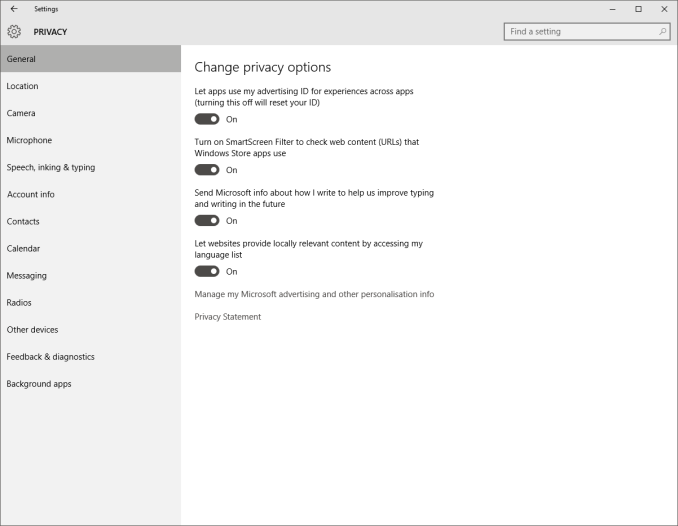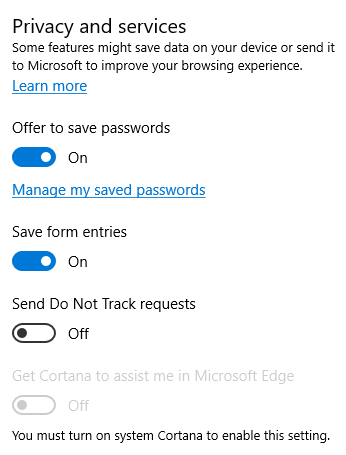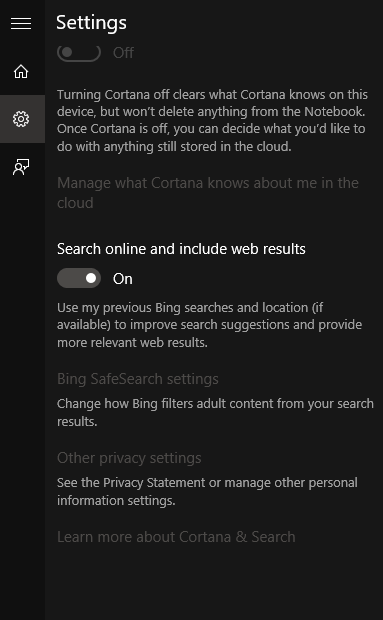The Windows 10 Review: The Old & New Face of Windows
by Brett Howse on August 25, 2015 8:00 AM EST- Posted in
- Operating Systems
- Microsoft
- Windows 10
Windows 10 Privacy
There has been an enormous amount of talk lately about Windows 10’s privacy settings, and what this means for people who use Windows 10. Yes, Windows 10 does do more with your data than any previous version of Windows, but that is not always a bad thing.
Many of the services which are designed to help you are going to require access to your information in order to function. Cortana can’t let you know about an upcoming event if it doesn’t have access to your calendar. The state of the world in 2015 is that in order for these types of services to work, you have to let them have access to your information. Cortana, as an example, does not live in a vacuum, and these same types of features are certainly prevalent on other operating systems too. Google Now is a great example of a service which people have come to really appreciate, and the very things they appreciate are based on the fact that it has a lot of access to your personal information.
Any person that is concerned about what Microsoft is collecting and how they are using it should really start by reading their Privacy Statement and getting an understanding about what is collected and what it is used for. Some of this is obvious, like Microsoft needs to provide access to your information if requested by a court order. Microsoft is not above the law. Some of it is not as obvious though, like what is your advertising ID.
Windows 10 is a free upgrade, but regardless of Windows 10 many of the services which are associated with it are free as well, such as outlook.com. Microsoft is paying for these services with advertising much like many other web services. In order to provide you with more relevant ads, you have an advertising ID associated with your account. Some people may not like this, and the privacy settings to turn this off can be found in Settings under the Privacy header. There are also more settings within Edge which let you enable Do Not Track requests and more.
Edge Privacy Settings
Search Privacy Settings
A lot of the discussion about privacy is how so much of this is on be default, and that is certainly true. If you choose Express Settings during setup, a lot of this is enabled. You can also choose Custom and choose what you want turned on during setup. Other services like Cortana are Opt-In, and will prompt you for consent the first time you try to access it. If you don’t want Cortana to access your information, please turn Cortana off.
For people that would like to read more about the individual features of Windows 10 and their privacy concerns, Microsoft has a Windows 10 Privacy FAQ page which you can take a look at. This goes over all of the features, what they do, and how you can turn them off. I really encourage users that are concerned to read this over.
Let’s be honest here for a minute though. The privacy concerns are certainly not overblown, but for most people, they will make the trade-off of less privacy if it means an improved experience. The textbook example here is advertising, where in order to deliver relevant ads to the user (or rather not serve them useless ads) the ad service must be able to learn something about the user and their preferences. Microsoft is certainly not the first company to do this, and Windows 10 is not even the first version of Windows where this is an issue. Many of these same concerns could be had with Windows 8 as well. But I think services like Cortana that are so proactive can touch a nerve with the privacy conscious and that is 100% fine. If you are concerned, the best thing to do is to read the privacy statement and adjust your settings accordingly.













293 Comments
View All Comments
prophet001 - Tuesday, August 25, 2015 - link
The spyware aspect of this OS bothers me. I'll be using Windows 7 until this is reconsidered.Michael Bay - Tuesday, August 25, 2015 - link
So, the same spyware.prophet001 - Tuesday, August 25, 2015 - link
Windows 7 doesn't even begin to approach this level of intrusion.Michael Bay - Tuesday, August 25, 2015 - link
As long as you believe that.wishgranter - Tuesday, August 25, 2015 - link
The Windows 10 EULA and Microsoft's Privacy Statement declare that Microsoft will access and use the content of people's emails and other files, such as documents uploaded to One Drive, according to Microsoft's discretion. "Share with our partners" also includes law enforcement, wherever Microsoft deems required. And I think Microsoft cannot ignore any instance which they feel should be forwarded to law enforcement without making themselves complicit in any potential criminal activity.Windows 10's all-your-contents-are-belongs-to-us policy is also a widening of the backdoor which law enforcement asks OS manufacturer to build into their systems.
Basically, Microsoft's Windows 10 EULA claims that all files used in Windows 10 may be accessed, searched, and contents utilized by Microsoft, with Microsoft exercizing sole discretion over what it will access, and how it will be used.
I think all businesses, content creators, and even nations should be dismayed at this. It looks like Russia already is concerned with Windows 10's always-on espionage against its users:
http://www.rt.com/politics/312172-windo ... ent-stirs/
If people will recall, Microsoft was previously found to be snooping in people's Outlook emails, and this discovery caused a furor among people, leading to Microsoft saying they would not do this anymore:
http://www.wired.com/2014/03/microsoft_vigilante/1
http://www.theverge.com/2014/3/20/55314 ... l-policies2
But now, Microsoft has made it a guaranteed policy of Windows 10 that they will always do this:
https://www.microsoft.com/en-gb/privacy ... fault.aspx
"Content. We collect content of your files and communications when necessary to provide you with the services you use. This includes: the content of your documents, photos, music or video you upload to a Microsoft service such as OneDrive. It also includes the content of your communications sent or received using Microsoft services, such as the:
- subject line and body of an email,
- text or other content of an instant message,
- audio and video recording of a video message, and
- audio recording and transcript of a voice message you receive or a text message you dictate."
Shouldn't there be a much bigger furor over the discretionless snooping of Windows 10, which includes all Outlook emails, than there was over just Outlook on its own?
Are people OK with their PCs contents no longer being their sole domain and in their privacy, but instead being fully open to Microsoft?
I'm not. I'll be sticking with Windows 7 for now.
Windows 10's motto: Your System is not Your Own
xenol - Tuesday, August 25, 2015 - link
You're reading the TP EULA. The actual Windows 10 EULA is at http://www.microsoft.com/en-us/Useterms/Retail/Win... , which defers the privacy stuff to Microsoft's privacy statement ( https://www.microsoft.com/en-us/privacystatement/ )Which says none or few of the things in the TP EULA (the only one I found in common is they may look at anything you upload to OneDrive, which you can disable on Windows 10 anyway)
Grooveriding - Tuesday, August 25, 2015 - link
Really unfortunate how far Microsoft went with privacy invasion and data trolling with Win 10. Fortunately you can disable what appears to be all of it with options, registry tweaks and disabling services.I would also recommend running a draconian firewall such as Tinywall that blocks all internet traffic and you have to allow applications on a case by case basis. As well as editing your hosts file to block all traffic back to Microsoft's data collection servers. As well, never use the OS with an MS account, just use a local account.
Pretty outrageous MS does not offer an option to disable everything without having to resort to these measures.
hansmuff - Tuesday, August 25, 2015 - link
The "sharing with law enforcement" is automatic for any data Microsoft has. If you're on 7 and use OneDrive, well there you go.Regarding the recording of voice data, that's a given with all of them. Siri, Google, now MS all use online services to improve detection and of course otherwise use that data. And they all send your recorded voice in some form or shape to their servers.
I can see how you'd tie it to Windows 10 because that centralizes a lot of those "new generation" of services that are in the cloud. But those services exist with or without Windows 10. I think it's wiser to educate people about what "the cloud" implies, which is exactly what you say; people do not have control over the data they store.
It's a cloud issue, and the cloud has provided the perfect vehicle for the likes of Apple, Google and Microsoft to take what they want. This goes for your PC, phone, tablet, everything.
Notmyusualid - Tuesday, August 25, 2015 - link
None of my phones or PCs send anything to the cloud.It is called privacy common sense.
Matts8 - Tuesday, August 25, 2015 - link
What phone do you have?